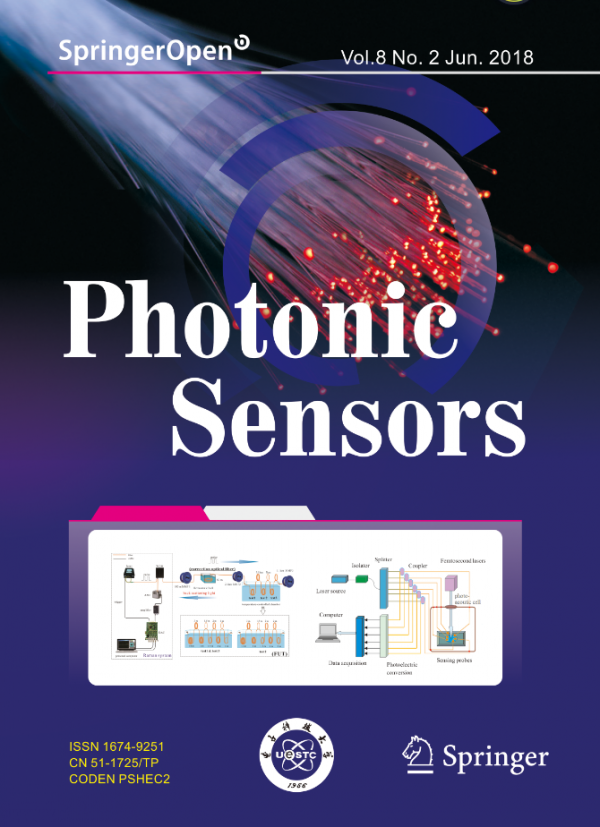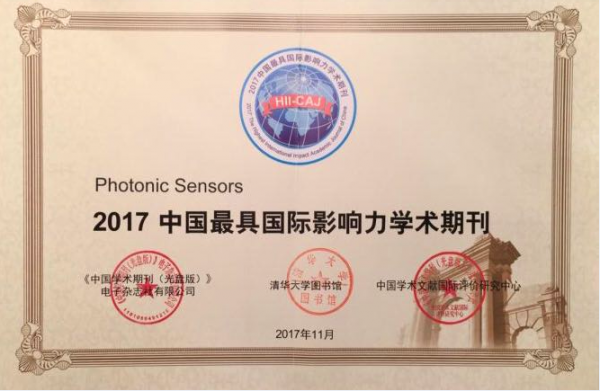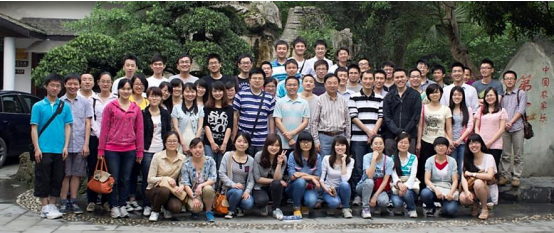Editor's Note: Recently, the international academic journal "Photonic Sensors," co-published by the University of Electronic Science and Technology of China (UESTC) and the renowned international publishing house, Springer in Germany, was officially included in the SCI database. This marks the first academic journal from UESTC to be indexed by SCI, signifying a significant enhancement in the university's academic journal publishing standards. The achievement of this breakthrough is closely tied to the dedication and pioneering efforts of Professor Yunjiang RAO and his team, the founding editors. In this exploration of the journey of "Photonic Sensors" towards SCI recognition, we interviewed Editor-in-Chief Professor Yunjiang RAO.

"Photonic Sensors" is the first academic journal in the field of photonic sensors globally.
Strategic Planning: Upholding the Aspiration for Excellence
More than a hundred years ago, before the famous scientist Buchan LIU went abroad to study, he once wrote, "Going to the Western seas here, I know how to strengthen China, and I have nothing to ask for, carrying the future of the country, learning the science of foreigners, leaving the country of my parents with adistanceof70,000 miles, and striving without regret!" For more than 100 years, thousands of Chinese scholars have followed this path, traveled thousands of miles abroad, returned home, and passed on the spark to the next generation, witnessing China's century-long road of science and education to rejuvenate the country. Yunjiang RAO, deputy director of the Academic Committee of UESTC and ProfessorfromSICE, is one of them.
Reflecting on the inception of "Photonic Sensors," it is crucial to delve into Professor Yunjiang RAO's personal aspirations. Hailing from a military family, Yunjiang RAO was instilled with the values of integrity and determination from an early age. Despite spending ten years working and living in the United Kingdom, he never harbored the thought of staying there permanently. In 1999, at the age of 37, Yunjiang RAO made the decisive choice to return to China. In 2004, he joined UESTC as the dean of the School of Communication and Information Engineering. With the university's support, he established the Fiber Optic Sensing and Devices team, attracting a group of young faculty members. The team has flourished ever since.
As we all know, sensors, as human tentacles, allow people to feel and understand the world, and the development of sensors has also laid a solid foundation for the modern information society. In this field, photonic sensors are one of the most promising directions, which have developed rapidly in recent years, and are widely used in energy, aerospace, environment, medicine, military and other aspects because of their unique advantages. In 2008, Yunjiang RAO initiated and held the first Asia-Pacific Optical Sensors International Conference (APOS), which has become one of the three major international conferences in the field of optical fiber sensing.
During this conference, he keenly sensed the increasing need for scholars in the field of photonic sensing to publish and access research papers. Existing mainstream international journals in the sensing domain, such as "IEEE Sensors," predominantly focused on electronic sensors, having no high-level journal focusing on photon sensing science and technology to report the academic research progress and engineering technology achievements in a timely manner, which cannot meet the needs of the rapid development of photon sensing technology.
"The more promising photon sensing is, the more viable academic journals will be." The prediction of the development prospects in the field of photon sensing made Yunjiang RAO firmly decide to set up a journal. The feelings of serving the motherland and the drive to pursue first-class made him decide to make a first-class international journal, make up for this gap, and make a voice for the Chinese people in the stage of international sensing academic journals.
Breaking Ground: Paving the Way Through Challenges
Launching and establishing a journal internationally, especially securing a place in SCI, is a formidable task for a resource-constrained Chinese team lacking inherent advantages. However, armed with the confidence and responsibility to "lead and do something pioneering," Yunjiang RAO embarked on this challenging endeavor.
At the beginning, the endorsement of the journal by influential figures played a crucial role in establishing its credibility. Professor Brian Culshaw, Yunjiang RAO's doctoral advisor, former president of the International Society for Optical Engineering, and a renowned scholar in the field of fiber optic sensing at the University of Strathclyde in the UK, wrote a recommendation letter for the journal. As one of the pioneers in the field of fiber optic sensing, his recommendation provided substantial validation of the value and significance of "Photonic Sensors." Additionally, Professor David Jackson, another mentor of Yunjiang RAO and a trailblazer in fiber optic sensing at the University of Kent in the UK, played a crucial role in the successful establishment of the journal. According to Yunjiang RAO, "The guidance and assistance of these renowned scholars laid the foundation for the successful launch of the journal."
The development of the journal experienced a low period, marked by low visibility, reduced submissions, and limited influence. During this challenging time, the team, led by Yunjiang RAO, made collective effort. The chief editor and the team teachers and the editorial department of the journal worked together to invite several distinguished experts as guest associate editors to organize special issues. These experts, coming from the UK, Australia, Japan, and China, increased from the initial 15 to 36. As a result, the quantity and quality of submissions steadily increased, and the number of paper downloads surpassed 100,000. Eventually, "Photonic Sensors" overcame its most challenging phase and was included in the Emerging Science Citation Index (ESCI) in 2016. By the end of 2017, the journal entered the SCI database, realizing the team's "dream of an international SCI journal."
After overcoming the most challenging entrepreneurial phase, Yunjiang RAO's team consciously strengthened the journal's promotion through various academic channels, gaining recommendations from multiple sources. The influence of the journal continued to grow. As Yunjiang RAO stated, "Having persevered through the challenges, it's like stepping onto a new platform, bringing new surprises."
Conclusion: Strategies for the Growth of an SCI Journal

In November 2017, "Photonic Sensors" once again won the "China's Most Internationally Influential Academic Journal" award.
According to Yunjiang RAO, Springer, a well-recognized German publishing house, is one of the best platforms globally. Negotiating with Springer, the university intervened at a critical moment and provided separate funding support from the discipline construction funds to resolve the financial challenges. Yunjiang RAO emphasized, "Choosing Springer as a partner, especially as it has now acquired the Nature Group, the world's largest publishing house, indicates that our choice was accurate."
Sharing the experience of founding the journal, Yunjiang RAO believes that, in addition to receiving guidance and assistance from renowned professors Brian Culshaw and David Jackson, and employing marketing principles for promotion, the dedication of the journal's editor-in-chief and team, as well as the high-level editorial board and publishing platform, are also crucial aspects. Running a journal is a purely altruistic service for researchers; however, Yunjiang RAO's team is practical rather than ostentatious. On the contrary, everyone takes pride in possessing the drive for relentless progress and a spirit of diligent research, and the recognition of the concept of team development and the willingness to selflessly contribute to the research peers contribute to the success of the journal. The team, with the assistance of young professors Yuan GONG, Weili ZHANG, and Zinan WANG as associate editors, made significant contributions to the daily operations of the journal, leading to its inclusion in SCI. The editorial board, typically composed of internationally renowned scholars, played a crucial role by inviting high-quality academic papers, especially lengthy review articles, based on their recognition of the editor-in-chief and expectations for the journal. Platforms like the German Springer publishing house, adhering to the rigorous and high-standard German tradition, played an active role in the subsequent distribution and publication of the journal and its formal entry into SCI.
Looking to the future, Yunjiang RAO hopes that the journal will continue to improve its editorial quality, become a second quartile journal in the Journal Citation Reports (JCR), and have a greater impact internationally, making more significant contributions to the development of the field of photonic sensors.
Strategic Vision: Building an International Academic Height in the Field of Photonic Sensors
Establishing and developing "Photonic Sensors" into a world-class journal in the field of sensors is just one aspect of the three five-year plans set by the ambitious team led by Yunjiang RAO, aiming to catch up with international standards.
"We are an engineering team, not only committed to first-rate scientific research but also making genuine contributions to the country and society." Yunjiang RAO has been guiding the team's development with this philosophy. In the three five-year plans from 2006 to 2020, the team proposed a development strategy of "having lofty aspirations, pursuing excellence, combining Eastern and Western elements, and being broad-minded and down-to-earth." This strategy outlined goals and tasks for three stages: the initial stage, the development stage, and the take-off stage, leading the development of research in the field of "fiber optic sensing and devices," which is closely related to the national economy and people's livelihoods. The team gradually formed its unique culture, emphasizing "doing things that others haven't done before." The team clearly stated its intention to follow an international development path, viewing each step with an international perspective.

Optical fiber sensing and device team led by Professor Yunjiang RAO
After more than ten years of hard work, in addition to establishing the first SCI journal at our university, "Photonic Sensors," the team has made significant progress, striving to create China's academic highland: the team has led to winning one national teaching achievement award, four provincial and ministerial-level science and technology awards, and took the lead in establishing the "Fiber Optic Sensing and Communication" innovation team of the Ministry of Education. The team also led our university's first major instrument project funded by the National Natural Science Foundation, published the first primary/ corresponding author paper in the prestigious journal "Nature," and facilitated the establishment of the Fiber Optic Engineering Optics Joint Research Center with the world-class university, the University of New South Wales in Australia. In addition, in 2017, the monograph "Fibre-Optic Fabry-Perot Sensors," co-authored by Yunjiang RAO and team members, was published by the American CRC Press as one of the six series monographs in the field of fiber optic sensing. Previously, the textbook "Optical Fiber Sensor Technology," co-authored by Yunjiang RAO and the honorary professor of our university and academician of the Royal Academy of Engineering in the UK, Ken Grattan, has become a classic textbook in the field of fiber optic sensing. In 2017, Yunjiang RAO was elected as an IEEE Fellow, becoming the first scientist in the international field of fiber optic sensing to be elected as a Fellow of the three major international societies: IEEE/OSA/SPIE. Among the graduates guided by Yunjiang RAO, there are nationally outstanding doctoral candidates, national distinguished young scholars, well-known university professors, industry elites in major technology companies, and technical backbones in national defense and public institutions, achieving fruitful results.
"Seeking the top will surely achieve the middle; seeking the middle will surely achieve the bottom." Yunjiang RAO believes that for doing things well, vision and perspective are crucial. Like playing chess, you need to plan ahead. To build a world-class team, it's not enough to do well in one aspect; instead, various influences and efforts are needed to enter the ranks of world-class teams.
"Always climbing to new heights, always on the road." The former reflects an aspiration, and the latter indicates an attitude towards doing things, always staying down-to-earth and never stopping. Yunjiang RAO smiles and says, "Just like the UESTC spirit of seeking truth and being pragmatic, having advanced ideas, daring to challenge, and the belief in being a pioneer are not just slogans but resonant actions. On the journey of building 'Double First-Class,' we firmly believe that the goals must be lofty, and we hope that the university will have more SCI journals and research teams that support the development of the university's disciplines. This is the 'Double First-Class' university we envision!"